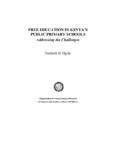FREE EDUCATION IN KENYA’S PUBLIC PRIMARY SCHOOLS Addressing the Challenges
Abstract
This study was designed to examine ways of overcoming the obstacles faced by FPE in Kenyan public schools. The study adopted ex-post factoresearch design. The target population of the study were the PPS pupils, teachers, parents, committee members, DEOs and PDEs in Nairobi, Nakuru, Eldoret, Busia, Bungoma, Rachuonyo, Kisumu, Embu, Kitui,, Mombasa, Kwale, Isiolo, Marsabit, Nyandarua, and Thika districts. This target population represented the entire population in over 18,000 primary schools. Fieldwork research involved a survey of the participants divided into two groups. Data was collected using observations with one group while questionnaires and interview schedule were used with the other group. Piloting was done in Kakamega district to refine the research instruments and to ensure the accuracy of the subsequent data. There was consensus that the FPE programme was a major milestone in the country’s education system as it opened the doors for children who would otherwise have missed a chance to receive education and improve their lives. This is supported by the finding of increased pupil enrolment in PPS since 2003. It also emerged that the FPE programme is popular. Notwithstanding the numerous benefits that have accrued due to FPE, it was noted that the programme had killed community initiatives in education funding and provision. Although the communities were keen to provide physical, material and financial support to schools, they have withdrawn from this in the recent past. They have been made to understand that the government has taken over the full responsibility of providing education. It is hoped that the findings of this study would assist the government in formulating FPE policy that would benefit all the stakeholders by enhancing team work and sustainability of FPE.
Collections
- School of Education [203]

